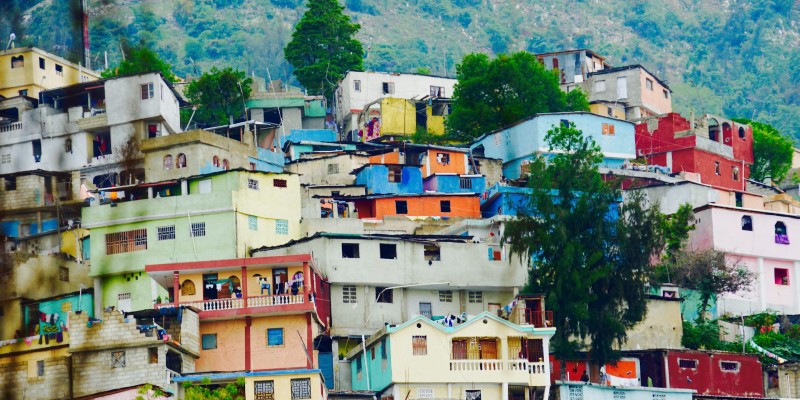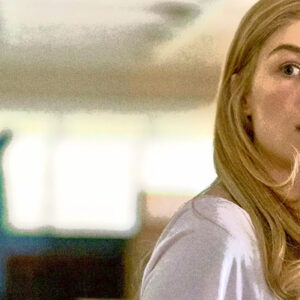Haiti has never been an easy place to live. From colonialism to liberation by the ex-slave revolutionary leader Toussaint Louverture at the start of the nineteenth century – the largest slave uprising since Spartacus – it’s been a country wracked by violence, foreign interference, and division. A country that seemingly has no luck – dictators, foreign invaders and the disastrous earthquake of 2010 too. Yet, despite endemic poverty, disease and corruption, it is a country of staggering natural beauty that has long attracted foreign writers as well as producing its own writers and now a vibrant diaspora too. Let’s take a look at the crime writing around Haiti and its capital of colourful gingerbread-style houses, Port-au-Prince.
For many English language readers of a certain age the literature on Haiti begins (and all too often unfortunately ends…) with Graham Greene’s The Comedians (1966). It’s a tragicomedy is set in Part-au-Prince under Duvalier and his sinister secret police, the Tonton Macoute. Richard Burton of course turned it into a celluloid classic (which invariably seems to happen to Greene novels – The Third Man, Brighton Rock, The Quiet American, The Power and the Glory, The End of the Affair, Our Man in Havana, The Fallen Idol – did any writer ever have so many successful adaptations?). Basically three men meet on a boat to Port-au-Prince: Brown, the narrator who owns a hotel in the Haitian capital; the idealistic but naive Smith, a former US presidential candidate; and Jones, a conman with some charm. These are The Comedians and they then live and interact Haiti’s corruption and violence. As with much writing about Haiti, history casts a long shadow. In the case of The Comedians the never seen but constantly acknowledged presence of dictator Papa Doc Duvalier. Of course Greene, as in The Quiet American, is critiquing US Cold War policy and he’s never very kind about it – Duvalier another supposed “bulwark against the communism” to prevent the dominoes falling this time in the Caribbean rather than Southeast Asia. After the novel’s publication a very angry Papa Doc banned Greene and his book from the country.
But of course there’s more to Haitian literature than just Greene. And to give you an idea of just how much Haiti is home to not one, but two, books in the essential Akashic Noir series.
The first, Haiti Noir, published in 2011, was edited by Edwidge Danticat and features stories by Danticat as well as Madison Smartt Bell, Gary Victor, Jessica Fievre, Marilene Phipps, Marie Ketsia Theodore-Pharel, Katie Ulysse, Yanick Lahens, Evelyne Trouillot, Kettly Mars and Rodney Saint-Eloi. Then in 2013 there appeared Akashic Noir’s Haiti Noir 2: The Classics, once again edited by Danticat and featuring Danielle Legros Georges, Jacques Roumain, Ida Faubert, Jacques-Stephen Alexis, Jan J. Dominique, Paulette Poujol Oriol, Lyonel Trouillot, Emmelie Prophète, Ben Fountain, Dany Laferrière, Georges Anglade, Danticat, Michèle Voltaire Marcelin, Èzili Dantò, Marie-Hélène Laforest, Nick Stone, Marilène Phipps-Kettlewell, Myriam J.A. Chancey, and Roxane Gay. The contributors are a mix of Haitian and (mostly) American writers.
Talking of Edwidge Danticat – Hiding in a barber’s shop in Brooklyn, hoping his former victims never recognise him, is a former torturer of the 1960s Duvalier era, a group known as Dew Breakers. The Dew Breaker (2004), from Haiti’s best-known novelist, Danticat, switches back and forth from Brooklyn to Duvalier-era Haiti. Danticat is originally from Port-au-Prince though now lives and teaches in America where she moved as a 12-year-old child. The novel powerfully evokes the brutal past of Haiti and contrasts it with the hope of the many who have left to try and forge new lives in America’s cities.
Roxane Gay is an American writer of Haitian descent. In 2014, she published her debut novel, An Untamed State, the story of Mireille Duval Jameson, a Haitian-American woman who is kidnapped for ransom. It is not quite perhaps a straight forward crime novel though through the criminal act of the kidnapping discusses bigger themes such as displacement, sexual violence, race and Haitian society.
English writer Nick Lake’s In Darkness was the winner of the 2013 Printz Award. Set amid the rubble of the 2010 Haitian earthquake, a boy is trapped beneath a collapse hospital, thirsty, terrified and alone. Shorty is a child of the slums, a teenage boy who has seen enough violence to last a lifetime, and who has been inexorably drawn into the world of the gangsters who rule the shanty town of Site Solèy. But Shorty is bent on revenge and wants to find the twin sister he lost seven years ago. The book is normally recommended at a YA teenage read, but others in the higher age ranges (!) will also enjoy In Darkness.
More up to date is Philadelphia Inquirer journalist Michael Matza’s Haiti, Love and Murder in the Season of Soup Joumou (2022). American journalist Charlie Carter, British nurse Corinne Martin, Haitian investigator Kenley Claud and FBI special agent Jean “JB” Belizaire hunt for whoever killed Dr. Sanctis Beauvoir through Port-au-Prince’s markets, notorious Cité Soleil shantytown, high-end hotels, gang houses, rundown hospital to Miami’s “Little Haiti” and the pill-hawking “street pharmacists” of Croix-des-Bouquets. Reviewers have noted that Matza’s novel appears to foreshadow the assassination of Haitian President Jovenel Moisë in 2021.
Mr Clarinet (2006) is Nick Stone’s first book in his Miami private investigator Max Mingus series. Mingus is offered an unbelievable $10 million to locate a billionaire’s son, Charlie Carver – missing now for over three years. Charlie disappeared in Haiti, where over the decades scores of children have vanished. Word is the abductor is the seemingly mythical figure called ‘Mr Clarinet’, who for years has been tempting children away from their families, but to get to him Mingus must get past the island’s drug-runners and corrupt cops. The follow up book, King of Swords (2008) sees Mingus safely back in Miami and on the trail of a serial killer who leaves tarot cards as his signature.
Vicki Delany is one of Canada’s most prolific and varied crime writers and a past president of the Crime Writers of Canada. Among her many cozies and other crime novels she does also write a tougher, more noir series featuring RCMP sergeant Ray Robertson who is serving with the United Nations in Haiti. In Haitian Grave (2015) Robertson is tasked with training the local police and assisting investigations. Then a wealthy American businessman’s Haitian wife is found floating face down in their swimming pool The man came home to find his beautiful, young Haitian wife floating face down in the swimming pool. Robertson is much travelled in the series – in Juba Good (2014) he heads to South Sudan and in Blood and Belonging (2017) he’s back in the Caribbean in the Turks and Caicos Islands.
And finally a great novel from Haitian-born and now New Yorker Francesca Momplaisir, My Mother’s House (2020). Lucien flees Haiti with his wife, Marie-Ange, and their three children to New York City’s South Ozone Park. He is chasing the immigrant dream – reinvention, wealth, and comfort. He buys a run-down house Lucien and Marie-Ange call their home La Kay – “my mother’s house” – and it becomes a place where their fellow Haitian immigrants can find peace, a good meal, and legal help. But as a severely emotionally damaged man emigrating from a country whose evils he knows to one whose evils he doesn’t, Lucien soon falls into his worst habits and impulses, with La Kay as the backdrop for his lasciviousness. Momplaisir’s novel is not necessarily a crime novel in the sense of the genre shelf – but it is a book about what happens to people when they are surrounded by the crimes of corruption, poverty, indifference, casual violence for most of their lives and then try and find something different. It’s not always an easy process.
Times remain tough in Haiti – poverty, gangs, a failing health service, rampant kidnapping, food shortages, natural disasters, political corruption. But, even faced with these seemingly insurmountable problems, Haitians and those that regularly visit and appreciate the country, are still finding time to write crime fiction. And in the case of Haiti the old adage about crime fiction as a widow into a society is perhaps more apposite than ever. As most of us will probably never visit popular fiction is one key way we can perhaps learn more about Haiti.

















